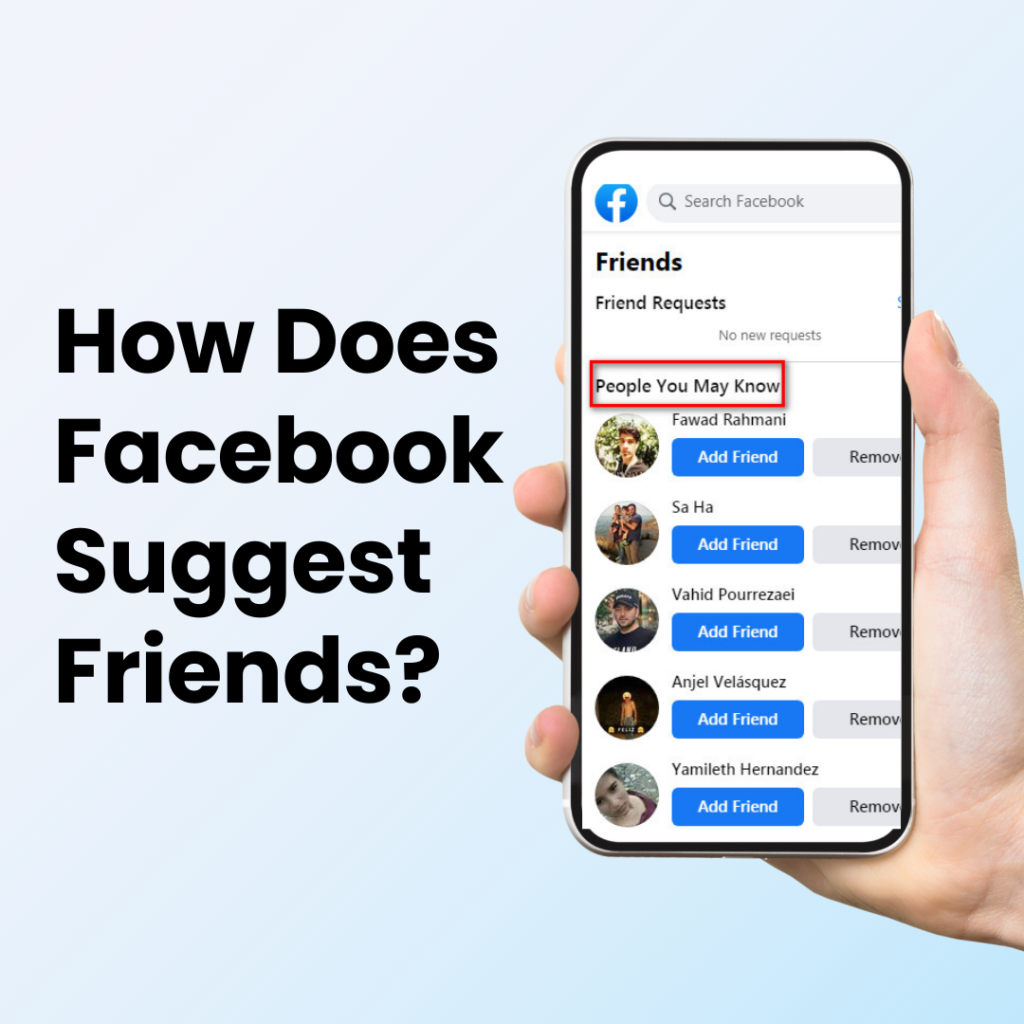Have you ever checked someone’s profile, then found them on your recommended friends list? And have you experienced the odd situation where people whom you seemingly have no connection with – perhaps no mutual friends whatsoever – show up in those suggestions as well? Let’s delve into the logic behind Facebook suggest friends who look at your profile. Also, let’s explore whether there’s a possibility of others discovering if you’ve been looking at their profiles, often referred to as ‘Facebook stalking’.
Must Read: How to Increase Conversion Rate on Facebook Ads
How Does Facebook Suggest Friends?
The question of whether viewing someone’s profile increases the likelihood of them appearing as a suggested friend remains a topic of debate. Although Facebook officially denies factoring this, many users have shared anecdotal evidence suggesting a potential connection.
The frequency and peculiarity of these occurrences lead some to believe that Facebook might indeed consider profile viewers when generating friend suggestions. Reports of this phenomenon first emerged in the context of online dating, particularly on the Tinder app. Tinder often facilitates matches between individuals who are complete strangers and lack any mutual friends.

Essentially, these two individuals had no prior connection, not even through extended friend circles. It’s also reasonable to assume that they have never interacted on platforms owned by Facebook’s parent company, Meta, such as Facebook or Instagram.
Tinder users noticed something strange. After talking on the app, their chat partners popped up as Facebook suggestions.
This situation could potentially indicate two possibilities:
- Tinder is sharing this data with Facebook (though this is improbable).
- The other person has searched for them on Facebook and discovered their Facebook profile.
- This behavior is reasonable as it’s natural to want to gather more information about someone before agreeing to meet in person.
Is it really a mere coincidence?
It’s hard to believe so. How could an individual, with whom you share no mutual friends and with whom you’ve never interacted on Facebook, suddenly appear as a friend suggestion?
The question arises: how does Facebook even recognize any connection between you two? This leads to the conclusion that Facebook might be considering this factor, even if they don’t openly acknowledge it as a criterion for friend recommendations.
Hence, it appears that a portion of the friend suggestions you receive could potentially be influenced by those who have viewed your Facebook profile – essentially, your Facebook “stalkers.”
Check out these concerning tweets shared by users on Twitter:
“Is anyone else receiving completely random friend suggestions on Facebook, with no connections or mutual friends, especially since the recent outage?” — Daisy ♌ (@daisylish) October 5, 2021
Another Personal Story
Although not identical, this instance serves to highlight a similar point:
I’ve gotten friend suggestions based on physical proximity, even without mutual friends or past interactions.
For instance, a contractor visiting my office appeared as a recommended friend later.
Likewise, people I talked to at parties showed up as suggestions days after.
Some of these individuals were never recommended to me until we were physically near each other. It’s important to note that we weren’t connected to the same Wi-Fi network; we were both using separate cellular data plans.
This suggests that Facebook might have gathered this information through GPS data. I can’t prove Facebook uses this for friend suggestions, but the timing and circumstances are too coincidental to ignore. Especially considering Facebook’s possible motives.
What Is Facebook’s Benefit From This?
It’s crucial to remember that Facebook’s primary business model doesn’t revolve around solely providing a social networking platform. Instead, its core objective is to capture your attention, gather extensive data about you, and subsequently utilize that data to fuel targeted advertisements.
This approach relies on boosting interactions to understand your feelings about the content and keep you engaged. This gathers more data and shows more ads.

In this pursuit, Facebook aims to promote the cultivation of meaningful friendships on its platform. An investigation by the NET Institute has demonstrated that users’ content output increases in tandem with the growth of their network. This observation aligns seamlessly with Facebook’s intentions. From a user’s perspective, Facebook serves as a medium for staying connected with others.
Still, it’s also a platform for sharing updates motivated by validation, connection, belief affirmation, and social status. All of these endeavors are augmented by possessing a larger audience of peers, enabling the fulfillment of these desires on a grander scale. This phenomenon explains the contemporary preoccupation with follower counts.
Our psychological inclinations tether us more closely to the platform when our friend count increases. This, in turn, leads to escalated content generation, heightened interaction, and increased time dedicated to consuming the content produced by our friends. All of these outcomes align harmoniously with Facebook’s overarching objectives.
Must Read: 5 Reasons Your Business Needs a Reputation Manager
What Does Facebook Claim About Friend Suggestions?
Does Facebook suggest friends who look at your profile? According to the NET Institute study mentioned earlier, a conclusive finding has emerged: “We demonstrate that strategies aimed at fostering social connections indirectly contribute to augmenting content creation on the platform, thus establishing a connection between the establishment of social ties and the generation of advertising revenue.”
As a result, it’s substantiated that Facebook’s revenue increases when its users cultivate more friendships on the platform. Given this financial incentive, Facebook is likely to employ any legally permissible means to advance this objective, which could encompass suggesting friends who have visited your profile.
The inner workings of Facebook’s friend suggestion algorithm are hidden. It’s far more complex than a single article can cover. However, the company asserts that the factors propelling the ‘People You May Know suggestions are as follows:
- Mutual friends.
- Your profile details, such as your educational background, workplace, or location.
- Activities on Facebook, including shared membership in mutual Facebook groups or being tagged in the same photo as the person in question.
- Contact details from your phone or email that you’ve imported into Facebook.
Facebook values data and aims to grow friend lists, making it unlikely to waste such important information. Consequently, there are likely other undisclosed factors influencing these suggestions that Facebook has chosen not to disclose.
Must Read: The Future of Mobile Advertising: Trends and Strategies to Watch
Conclusion
Is Facebook suggest friends who look at your profile? Can you end up in other users’ friend suggestions by engaging in ‘Facebook stalking’? This concept holds genuine potential, and a wealth of reports circulating on the internet has nearly solidified its authenticity.



